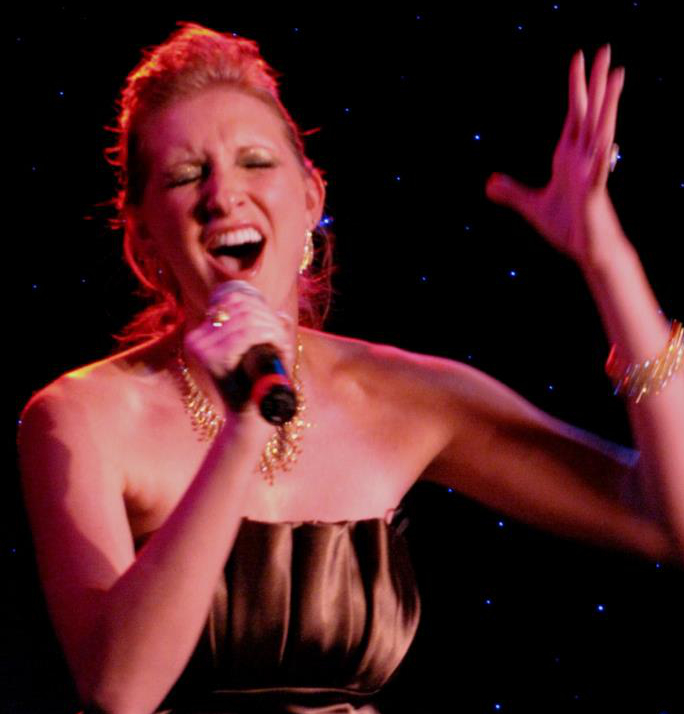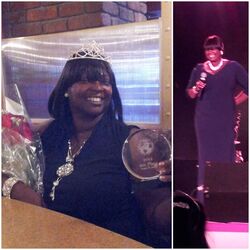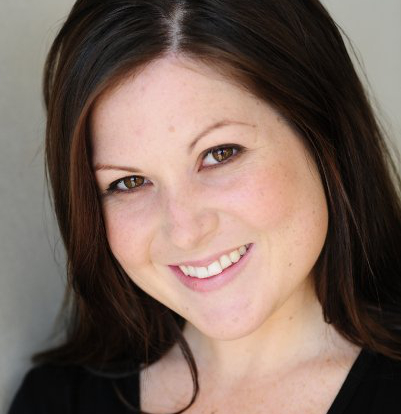How to Win a Singing Competition: 6 Effective Tips
I’ve not only been coaching singers for more than two decades, I have coached two world champion competitive singers as well as several national champions, state champions, and regional champions. Oh, and I’ve judged state, national, and international singing competitions. So, I thought I’d share with you some of my top tips for how to win a singing competition from my experiences on BOTH sides of the judging table.
These tips are the same ones I share with my clients who have won singing competitions, and they are the same ones I’ve seen carried out in singers I’ve judged who have won singing competitions.
How to Win a Singing Competition: Tip #1
Select Songs That Showcase Your Greatest Strength
I can’t tell you how many singers I’ve corrected who assume they have to show absolutely everything they are capable of doing in a competition. Singers often assume showing versatility is the best idea in a singing competition, however I find it puts singers at a huge disadvantage when it comes to scoring.
If you’re perplexed by my viewpoint, let’s imagine you want to get a tattoo and you are looking for the best tattoo artist. You find two to choose from. The first has been a tattoo artist since 2005, has tons of examples of beautifully designed tattoos on his website, and has a whole Yelp page of stellar reviews. The second tattoo artist has a cool website where you learn that in addition to being a tattoo artist, he’s also a personal chef to various local celebrities, and he works part-time as a dental hygienist.
Are you going to be more inclined to get inked by the guy whose skill is divided among three separate careers, or the guy who specializes in exactly what you want and has outstanding reviews to back it up? Chances are, the second tattoo artist is decent at tattoos, decent at cooking, and decent at dental hygiene, while the first guy isn’t just decent at tattoos, he’s proficient.
That’s what happens when you decide to showcase every skill you (think you) have in a competition. You have to be THE BEST at every skill you showcase in order for this plan to work.
Let’s say you are in a competition with 3 rounds and you decide you want to showcase your top skill which is emotional ballad singing in round one, then you want to show your ability to sing country music in round two, and your ability to sing in a foreign language in round 3.
Your stiffest competition is a gal whose forte is also singing emotional, heartfelt ballads which she plans to do in all three rounds. What this means is that in round one, you two might be neck and neck for the top position, but in the next two rounds, you are showcasing other things that aren’t your strong suit while your competition is showcasing more and more of her expertise at doing the thing she does best. In other words, you’ve just handed her the competition! I see this ALL. THE. TIME.
Singers decide in their minds that versatility will score them extra points. There are two major problems with that (false) assumption:
- That your judges will not only be the same in every round, but they will remember you and what you sang in the previous rounds enough to notice that you’re showing versatility.
- That your judges will also think that versatility deserves extra points EVEN THOUGH IT’S NOT PART OF THE JUDGING CRITERIA.
The third potential problem with this strategy of showing versatility is that your chances are very slim of being the very best at EVERYTHING you choose to show, which means each time you’re not the best, you’re handing the win to your competition.
My best advice for song selection in a competition is to identify what it is in your singing that you do the very best, and choose a song that showcases that strength in every single round.
Another hot tip: if your contest is scored cumulatively, always lead with your very best song in round one! Most singers will save their best song for the final round, but if there are eliminations between rounds, you may not get to the final round with this strategy. If you lead with your very best song, you are starting out with the highest amount of points possible, putting you ahead in the first round with less work to do moving forward.
Want help figuring out what the best songs for you are? Check out my free eBook, “Song Choice That Works.”

Song Choice That Works! How To Pick The Best Songs [FREE e-BOOK]
How to Win a Singing Competition: Tip #2
Take Care of Your Voice & Beef up Your Vocal Ability
You know what I hate hearing from competitive singers? Their limitations! I feel heartbroken when I hear singers saying things like, “I can’t sing that song because…(xyz excuse)”.
Your voice is capable of SO MUCH MORE than you’re likely giving it credit for. So much goes into a winning performance, but you HAVE to have the vocal skill to stand out. Even more important than that, though, is having the stamina to showcase your incredible vocal skill all the way through to the final note of the competition.
Every time I watch Hollywood Week on American Idol, I need to have the box of Kleenex handy because I know I’m going to start crying when my favorite singers start to lose their voices. I’m not just crying for their misfortune, I’m crying because their voice loss (and the public response to it) perpetuates the myth that voice loss is something to expect to happen when you sing for extended periods of time.I’ve developed a patent-pending vocal method that shows singers how to prevent voice loss and vocal fatigue for good.
The best part of this method is that while you learn all the steps for preventing voice loss and fatigue, you pick up incredible skill in the process which allows your voice to do anything you want with it. The most common feedback I receive is that after learning how to make voice loss a thing of the past, singers are blown away by what they are now capable of doing with their singing.
I do this work with my private and group clients, but I’ve also written a bestselling book outlining my method. I’d love to share a free excerpt from the book with you if you’re curious, which you can download below.

Read a Free Chapter of Never Lose Your Voice Again
How to Win a Singing Competition: Tip #3
Forget the Costumes and Props
Please, for the love of all things holy and sacred, stop wearing costumes and using props. They are taking away from your performance, NOT adding to it. I promise you.
One time, I was judging a national singing competition where every genre known to man seemed to have been represented. One gal decided to sing a song from the musical, Les Miserables.
Now, I have a solid musical theatre background, but not one of the other judges at the table was familiar with this musical. Because she was singing a song sung by a poor woman, she decided to wear a very simple brown dress with no jewelry, she smeared makeup on her face that looked like mud, and she messed up her hair.
For some context, this particular competition awards points for your outfit/appearance and they place a high value on bling and sparkles. This gal sang the song BEAUTIFULLY, yet it was her lowest scoring song of the entire contest, and likely was the reason she didn’t make the finals.
Why?
Because the rest of the judges at the table were so distracted by her appearance, they spent the majority of her song trying to understand why she looked so disheveled. As a result, it was hard for them to even notice how beautifully she sang the song.
Even I docked her some points for how she showed up because – while it may have matched the feel of the musical – it didn’t make sense with a standalone performance of the song, which is what she gave us.I have had the same experience with props.
How many times have you seen a concert where the lead singer brought on stage some random prop to use in their performance??
I’ve never seen it happen. Not one single time. Yet I have lost count of the number of times I’ve watched or judged a singing competition and seen singers carry out a prop to use in their song. And here’s the thing: most of the time, the prop applies to a single lyric in the song, which means the singer has to hold the prop the entire song just so they can utilize it for that one single line. It’s distracting!
Once again, we judges find ourselves trying to make sense of what’s in your hand (and why it’s there) instead of paying attention to your performance. Your performance suddenly becomes about the rose you are holding in your hand rather than the emotion you are feeling about the person you are singing to.
So, instead of relying on costumes and props to tell your story, learn how to connect to the emotion of your song so YOU can tell the story with your voice, your passion, and your stage presence. This will allow your audiences (including your judges) to feel captivated by your performances instead of distracted by them.
Check out this free training series I did on emotionally connecting to your songs.
How to Win a Singing Competition: Tip #4
Move With Purpose
Unpopular competition opinion: I love a good “park and bark”. A lot of competitions have scoring for stage presence or even use of the stage. Unfortunately, this means a lot of confused singers take that to mean that they need to cover as much square footage on the stage as possible, which creates a day full of zombie-like movement all over the stage.I clearly have no patience for this.
If you don’t have a reason to move, either find a reason or don’t move at all.
Why?
Movement “because you think you should” is always awkward – for you AND for your audience. Pacing, wandering, walking in tempo, rehearsed movement that looks stiff, walking backwards, and shuffling or kicking your feet are all examples of movement that lacks purpose and looks uncomfortably awkward. They are also all examples of movement I see most frequently when judging competitions.
So what does it mean or look like to move with purpose?
Let’s talk about gestures before we get into footwork. When you talk, your hands and arms move around to help illustrate your story. Your hands might make a gesture to emphasize an emotion or the point of your story.
Please take note that this is not at all the same thing as playing charades where your hands and arms are trying to act out WORDS so others can guess the words correctly. I’m constantly surprised how often singers get these two things confused and find themselves “playing charades” while singing.
To avoid playing charades, start by speaking your lyrics as text – or by paraphrasing them in your own words. Say them to a real person and mean what you’re saying. Do your hands or arms move at all when you speak these words? The natural movements of your hands and arms when speaking are the same movements you should make when singing these words. Remember that they are movements you make to emphasize your point or your emotions. They should be as natural and organic as the movements you make when speaking.
So now, let’s talk footwork. I already mentioned most of the pitfalls singers face when trying to move around on stage. We said we avoid those by moving with purpose. So let’s talk about what that looks like when it comes to moving your whole body. First of all, you do not need to be a choreographer to have great stage presence. No one will be judging your dancing abilities in a singing competition, so there’s no need to come up with choreography. If you are a FABULOUS dancer and you WANT to dance, go for it. Otherwise… I wouldn’t.
A lot of times, singers feel less confident during instrumental breaks and decide they would be a great time to move around the stage. My #1 issue with this strategy is that it looks exactly how I described it. So, instead of looking like you’re lost or like you’re getting your steps in for the day in order to avoid the awkwardness of not singing for a few measures, try to not move during these times and instead show us the emotions you’re feeling.
To move across the stage with purpose, you must have or find a reason to move in order to prevent it from looking painfully awkward. Repeated lines or choruses are a great place to make a move because never in life do we speak the same exact text two times in a row without making some kind of adjustment to the way we say it the second time. Movement forward, for example, can look as though you are emphasizing your point and comes across as natural and logical when you are repeating a line or a chorus.
Sometimes, I advise singers to find someone in the audience on the other side of the stage that seems engaged in your performance and make eye contact and head their way. You can even point or acknowledge them somehow physically when you make your move in their direction. It shows your audience that someone is in agreement with you about what you’re singing about, which once again, looks natural and logical. You can imagine that you are singing to someone specific who turns around and walks away, giving you a reason to go after them. You can be singing about someone who is (or was) standing in a particular spot on the stage which can give you a reason to indicate the location and/or move in that direction. Is this starting to make sense?
The best example I have for singers of this in real life is, if you were in a room full of people and I were to tell you to get up from your chair and go into the next room, you might hesitate at first, looking around to see if anyone else is following my instruction, and then eventually get up and wander to the next room in confusion. But if I were to tell you your best friend is in the next room and she just caught her shirt on fire, you’d jump out of your chair and run into the next room to help her. In the first example, you are moving because you think you should – and you look awkward and lost in the process. In the second example, you have a reason to move – and you look intentional in your movement.
How to Win a Singing Competition: Tip #5
Challenge Yourself to Accept Critique
Singing is a vulnerable act, no doubt about it. And it’s normal to not be an absolute pro at it without any support. It can feel scary to open yourself up to the feedback of another person, but when it comes to preparing for a competition, I highly recommend it. But here’s the thing: BE CHOOSY about the support and feedback you ask for and accept.
Your mom, your spouse or s/o, and your best friend are amazing cheerleaders and often your biggest truth-tellers. However, unless they also happen to be professional singers, voice or performance coaches, or competition judges, their critique and feedback will most likely be nothing more than a second opinion. People who love you dearly will either be too afraid to hurt your feelings to tell you the truth, or they’ll be hyper-critical because they feel comfortable enough with you to be blunt.
Also, people who love you may have personal preferences about your performances because they are accustomed to hearing you. For these reasons, I don’t recommend seeking out these types of people for critique and feedback on your competition performances and practice.
Fellow competitors are another place singers often go, which I find completely mystifying. Your fellow competitors understand the rules of the game and have their own strategies as well, so they seem like they’d be a reliable source for constructive and useful critique and feedback… except for one major flaw: they are competing against you. No matter how much you may love each other, if you or your fellow competitor are vying for the winning title, and they think you may have a shot at taking it from them – or vice versa – it’s going to be very difficult to provide honest feedback or critique.
For this reason, I don’t recommend relying on this type of feedback or critique on your competition performances and practice.
My best recommendation is to seek the advice of a hired experienced voice and/or performance coach. This type of professional is capable of being unbiased AND knowledgeable about critiquing your skill in a useful manner. Also, a performance professional that has been hired to support you is just as invested in your success as you are, which means they will make sure you aren’t compromising your goals when things get challenging.
How to Win a Singing Competition: Tip #6
Visualize Your Win
Most competitors go into competition with an “I hope I get it” mindset, completely unaware of how damaging this kind of thinking can be. Instead, get super clear about the win you desire to achieve, and decide what gets to happen two steps out. In other words, take your goal and identify what you get once you achieve it. Then, ask yourself what you get once you achieve THAT. This puts you envisioning your life two steps ahead of where you are. So, start living your life as if you’re already living the life of two steps ahead.
This does a couple of things:
- It removes a lot of the pressure to achieve because you are operating from a place of having already achieved it.
- It helps you perform that much better because you have nothing to prove.
My favorite example of this comes from my first World Champion singer, Mikko Blaze, who won the KWC World Championship in December of 2018.
When we first started working together in the summer of 2018, Mikko had never won anything but a state competition. He’d placed at the national level, but had never before won it. He wanted to win Nationals that year. I wanted him to win Worlds.
I asked him when and where the world competition was scheduled to happen. Assuming I’d misunderstood his goal of winning Nationals, he said, “Oh! No, I have to go to Nationals first!” I told him I knew that and he was still confused. I asked him how he gets to go to Worlds and he said (with a “duh!?” kind of expression and tone), “I have to win Nationals”. I said that was perfect and asked him my question again.
He was still confused but he answered my question. I told him I wanted him to tell his boss the next day that he needed to take those days off from work and that I wanted his partner to do the same thing if they wanted to both go to Worlds together. I told him to start looking into travel arrangements for his partner and to plan some fun activities they’d do during down time while abroad.
I could see his confusion growing so I asked him what he would want to happen when he wins Worlds. A dream-like expression came across his face and he told me he’d love to record an album of originals. I asked if that’s something he could do without winning Worlds and he said he couldn’t because he needed the money he’d win from the World competition in order to pay for the studio time.
So I told him I wanted him to focus his energy on recording that album. I asked him to start looking into studios, asking around about pricing and scheduling, and making sure he has the songs together that he’d want to record. I told him I wanted him to live his life as someone who is about to record his first album. His confusion was still written all over his face, so I explained myself. “If you can’t get to Worlds without winning Nationals, and you can’t record your album without winning Worlds, then if we focus our energy on recording your album, and live your life as if recording it is a done deal, then the other two things HAVE TO happen.”
And they did.
He won Nationals for his first time ever, went on to Worlds where he won the whole thing, and then recorded his album of original music.
He followed all the steps I advised him to take, all of which were pretty big risks that involved a lot of trust and decision on his part. But by taking that action and deciding to live two steps ahead, he was able to achieve all three of his goals (and mine).
Do this for yourself. Identify what your two steps out life looks like and start living it as if it’s a done deal. Make the bold decisions supporting that life as reality and then reap the rewards of goals achieved.
If you want custom help with this, I’d love to discuss working together privately. You can visit www.getmypowerup.com to set up a time to chat with me about it.




















Have a question or something to say? You'll hear back from me right away!